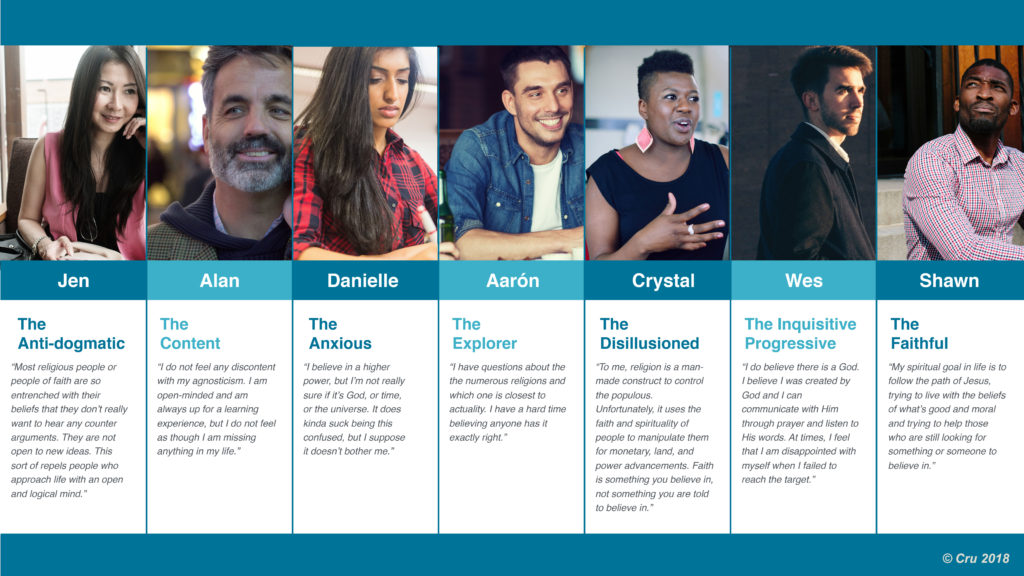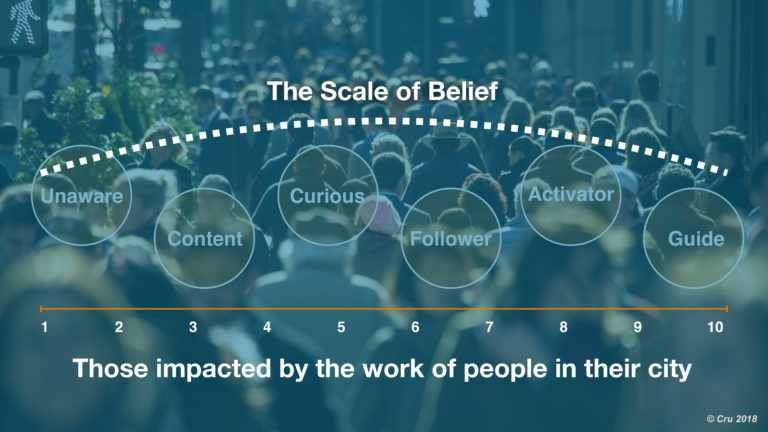Cru's Research Reveals Insight for Gospel Conversations
Originally published by The Send Institute on April 17, 2018, I wrote this article to reveal Cru's research and to provide insight for gospel conversations. I post it here again by way of reminder and encouragement.
Bill Bright (1921–2003) founded Campus Crusade for Christ (CCC) on the UCLA campus in 1951 with the primary goal of reaching university student leaders by proclaiming the message of salvation. Over the course of the past six decades, the movement has grown from a small band of staff on one campus to hundreds of thousands of campus and community ministries including Family Life, The Jesus Film, Athletes in Action that span the globe, and today is considered “one of the largest evangelical parachurch organizations in the world, with about 25,000 staff members in 191 countries.”[1]Notwithstanding this considerable growth and global experience, CCC leaders began to recognize the need to make significant organizational changes in an effort to strengthen and clarify Bright’s original vision to more effectively engage within a twenty-first-century context. The 2011 name change from “Campus Crusade for Christ” to “Cru” represents the first of these changes. After considerable research, collaboration, and prayer CCC changed its name to Cru primarily because the word “crusade,” a familiar term in mid-century evangelicalism, had become unnecessarily distracting.[2]
Additionally, in response to the mass migration of people to cities across the globe, Cru also launched a new effort in the U.S. to focus on mobilizing believers to advance the mission of Jesus in major cities across the country. With the express purpose of effectively engaging in gospel conversations in a twenty-first century urban context, Cru embarked on a journey to understand the current cultural and religious climate in the U.S. As a first step, we launched a project to provide a more comprehensive look at the people who live, work, and play in cities across the country.[3]
The study included a thorough evaluation of Cru’s historical philosophy and tools for evangelism most of which were developed in the mid-twentieth century and targeted a predominantly churched population. The resultant tools (including various iterations of the Four Spiritual Laws) and training practices were developed to reach and mobilize this particular group of people. Notably, most of Cru’s evangelistic tools have been (and continue to be) developed to reach students on university campuses—an audience that, for the most part, remains demographically constant.
Externally, the study included qualitative and quantitative analysis drawn from an audience of four hundred men and women between the ages of twenty-four and fifty-six, living in cities across the country, representing diverse backgrounds and religious worldviews. Significantly, over half of the people surveyed claim no religious affiliation and most found Christianity either offensive, inauthentic, unsafe, or simply irrelevant.
SEVEN PERSONAS WITH SIX POSTURES OF BELIEF
Seven types of personas emerged from the data representing six postures of belief. Markedly, the words used to describe the different personas and specific postures were not assigned by us, but were specifically used by the interviewees.
Of the 400 surveyed, 84% are ready and willing to engage in spiritual conversations
Not surprisingly, these personas fall along a “scale of belief” easily recognizable in Scripture. On the far left of the scale, we find the “unaware” and “content,” those who have no interest in or feel no need for religion or the gospel. In the middle falls the “curious”—someone like Danielle who senses the reality of a “higher power” but is not sure who or what that higher power is; or Aarón, who is aware of the abundance of religious options, but has a “hard time believing anyone is exactly right.” On the far-right side of the scale falls the “follower,” the “activator,” and the “guide.” These groups actively engage in religious activity in some form or fashion.
CONCLUSIONS TO DRIVE CONVERSATIONS
The research also revealed some very good news: of the 400 surveyed, 84% are ready and willing to engage in spiritual conversations. Conversely, many do not believe Christians are ready or willing to participate in a conversation with someone with a different point of view. Many had experienced Christians talking at them rather than listening or engaging in a meaningful dialogue, which rings true to a twentieth-century approach. Historically, Cru and most evangelical organizations and churches, presented the gospel using a tract like the Four Spiritual Laws and called for a response, very often resulting in conversion. However, effective twenty-first-century gospel conversations, due in large part to an increasingly pluralistic culture, often will require time and patience, boldness and courage, vulnerability and transparency, and multiple conversations. Additionally, the diversity of the population and religious worldviews, complex cultural and social issues, beg for a thoughtfully contextualized approach to evangelism.
FIVE NECESSARY BEHAVIORS EMERGED AS STARTING POINTS FOR GOSPEL CONVERSATIONS:
Be present and listen—Follow the conversation and not your agenda
Find common ground—Build a relational bridge
Walk in their shoes—Understand their story
Talk like a real person—Use words meant for real people and not the pews
Create a better story than the one they’ve heard[4]
A future article will discuss three core longings of peace, prosperity, and purpose as viable pathways for conversation; and will examine steps Cru is taking to reimagine robust and biblically sound ways to engage with the ever-changing culture in cities across North America. One thing is certain, a more intentional approach to gospel conversations is a great place to start.
[1] Sarah Bailey, Campus Crusade Changes Name to Cru, Christianity Today, 2011 (Online: http://www.christianitytoday.com/ct2011/julyweb-long/campus-crusade-name-change.html).
[2] Ibid.
[3] Brooke Wright, Rick Fossum, Neil Bedwell, Gail Brooks, Cru City Brand Messaging Project, (Atlanta: Cyrano Collective), 2016. Cru Sanctioned Research.
[4] © Cru 2018.





